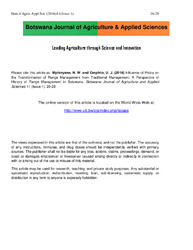Influence of Policy on the Transformation of Range Management from Traditional Management: A Perspective of History of Range Management in Botswana
Abstract
The government of Botswana, through an Act of parliament enacted the Tribal Land Act of 1968 which gave Land Boards the power to allocate land which previously was allocated by chiefs. Most farmers only applied for water rights, probably because grazing rights required fencing. The failure by farmers to acquire grazing rights and their apparent willingness to water more than just their own livestock resulted in considerable overstocking and overgrazing around water sources. Incentives to manage the range were lacking as farmers still thought the land was free for all and finite despite the fact that they now had water rights. Exclusive land rights such as in freehold areas had not resulted in better methods of range management. Unfortunately, it is difficult to run a ranch effectively using semi-skilled workers. There are no policy records on range management prior to the country’s 1966 independence from Britain. Government introduced the Tribal Grazing Land Policy (TGLP) in 1975 as its first attempt to transform the grazing management from traditional management. The National Policy on Agricultural Development in 1991 is a follow-up on the TGLP. There had been reluctance on the part of the Government to enforce the law which allows the prosecution of individuals who mismanage the land. If progress in rangeland management is to be made in the communal sector, weekend and absentee farmers should be given the least priority when allocating ranches. Unfortunately, only cattle slaughtered at Botswana Meat Commission (BMC) carry a levy cost yet the whole cattle herd industry is heavily subsidized. This paper focuses on the transformation of range management from tradition as influenced by government policies and the consequences therein.
.

